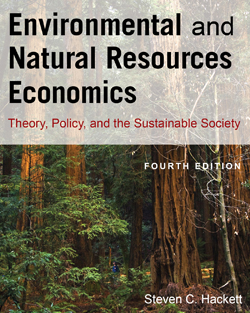
Rated by critics as the go-to source for natural resource, environmental and social science students who are new to economics, the fourth edition of Hackett’s interdisciplinary treatment tours the horizon in depth. It summarizes the latest scientific, economic and environmental basics, reinforced by all-new chapters on pollution regulation, energy consumption, economic policy instruments and fisheries management, among others. These are combined with a full array of readable tables and time-saving tips on prime Internet sources that students can use to explore original research worldwide.
Hackett also dissects the hard political and policy tradeoffs that occur when environmental and natural resource requirements collide with economic and marketing imperatives. Pollution taxes, for example, are simpler to administer than cap-and-trade, but companies can pass along the extra costs to consumers as the price of doing business. Poorly designed fishery management can lead to overcapitalization and reduced profits. Legislating balanced climate change policy runs afoul of the wide gap in opinion between scientists and the public, which is less convinced than experts and specialists about the degree of the threat.

Hackett’s harmonizing of multiple disciplines “‘stands out in a crowded field of textbooks,’” says Dr. James Wilen, University of California, Davis, “‘with less-commonly covered material on ethics, self-governance, political economy, compliance, market power, environmental justice, sustainability and green markets.”
Dr. Thomas P. Lyon, Director of the University of Michigan’s Erb Institute for Global Sustainable Enterprise, adds, “‘Unlike most textbooks in environmental economics, Hackett’s puts philosophical issues front and center. He also provides extensive coverage of sustainability, a topic of growing importance that has been ignored by many mainstream texts.’”
A past Humboldt State Scholar of the Year, Hackett says he designed the book “to prepare students who will be the nation’s next economists, scientists, policy makers, environmentalists and political leaders to resolve the enduring and intractable conflicts between consumption and conservation of resources.”
Standard economic studies can obscure policy choices that have to be made in the public arena, Hackett adds. His text combines instruction in economic fundamentals with an emphasis on interdisciplinary study—business, forestry, environmental science, and natural resources planning. “You have to make economics accessible to the applications that students are interested in. Otherwise, it’s just sterile theory,” he says.